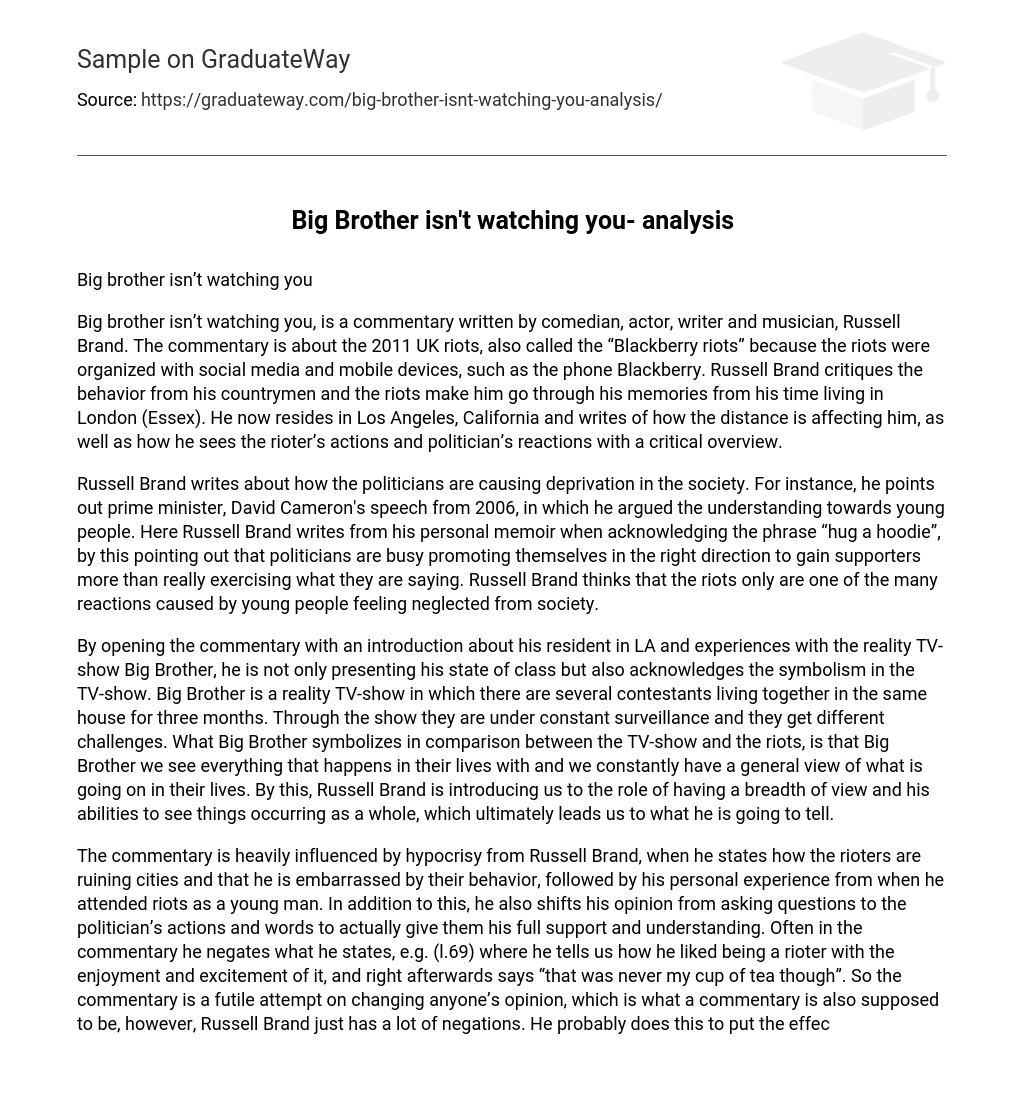Big brother isn’t watching you
Big brother isn’t watching you, is a commentary written by comedian, actor, writer and musician, Russell Brand. The commentary is about the 2011 UK riots, also called the “Blackberry riots” because the riots were organized with social media and mobile devices, such as the phone Blackberry. Russell Brand critiques the behavior from his countrymen and the riots make him go through his memories from his time living in London (Essex). He now resides in Los Angeles, California and writes of how the distance is affecting him, as well as how he sees the rioter’s actions and politician’s reactions with a critical overview.
Russell Brand writes about how the politicians are causing deprivation in the society. For instance, he points out prime minister, David Cameron’s speech from 2006, in which he argued the understanding towards young people. Here Russell Brand writes from his personal memoir when acknowledging the phrase “hug a hoodie”, by this pointing out that politicians are busy promoting themselves in the right direction to gain supporters more than really exercising what they are saying. Russell Brand thinks that the riots only are one of the many reactions caused by young people feeling neglected from society.
By opening the commentary with an introduction about his resident in LA and experiences with the reality TV-show Big Brother, he is not only presenting his state of class but also acknowledges the symbolism in the TV-show. Big Brother is a reality TV-show in which there are several contestants living together in the same house for three months. Through the show they are under constant surveillance and they get different challenges. What Big Brother symbolizes in comparison between the TV-show and the riots, is that Big Brother we see everything that happens in their lives with and we constantly have a general view of what is going on in their lives. By this, Russell Brand is introducing us to the role of having a breadth of view and his abilities to see things occurring as a whole, which ultimately leads us to what he is going to tell.
The commentary is heavily influenced by hypocrisy from Russell Brand, when he states how the rioters are ruining cities and that he is embarrassed by their behavior, followed by his personal experience from when he attended riots as a young man. In addition to this, he also shifts his opinion from asking questions to the politician’s actions and words to actually give them his full support and understanding. Often in the commentary he negates what he states, e.g. (l.69) where he tells us how he liked being a rioter with the enjoyment and excitement of it, and right afterwards says “that was never my cup of tea though”. So the commentary is a futile attempt on changing anyone’s opinion, which is what a commentary is also supposed to be, however, Russell Brand just has a lot of negations. He probably does this to put the effects of the riots into perspective and make questions pop-up to the reader.
His choice of words and the style of commentary are very informal. Informal in the way that he uses slang and is very unequivocal in his language, e.g. (l.69) where he uses the word “Old Bill” instead of the police and (l.100) when he uses the word “fucking”. In oblique terms, we see a pattern of sarcasm and irony. Often he implies questions and answers to what he states, and is therefore creating a conversation between him and the reader. He often finds conclusions that are based on insufficient and biased information, therefore leaving him as an unreliable source. He uses Pathos in his commentary to show compassion between him and the young rioters. Here seen from l. 95 and down to l. 105, Brand is compellingly telling us as to how the politicians are not reaching out enough to the young generation.
That the young people really have no motivation in contributing to the community, when all the young people think society is tearing their community apart. Russell Brand himself admits that his rhetorical use of logos is not reliable. Since he resides in California, he is not fully updated and informed about the whole situation the same way as if he lived there. He states in his commentary several of quotes and sayings from politicians to make the text coherent and sound as though he is appealing to a logic reason. He also does this to bring different perspectives into his text.
His way of expressing himself is very intriguing to me. Although he constantly mixes his own opinion with things he hears or knows, I think it is a good way of getting the readers attention. By using an informal language, it takes the commentary to the level of young people. Although he is a comedian, I think Brand wrote this way so that he could reach out to the young rioters. Russell Brand is definitely of a provoking character. He is not afraid to tell the naked truth and admit that his expertise does not include knowing everything, but that it still allows him to comment on what his happening in his hometown. The fact that it is not a statement from a college professor has a less boring effect.
The Big brother isn’t watching you commentary titled by Russell Brand, definitely defines that the riots do not have a “big brother” watching them. It is an action taken by people themselves and the reaction from people outside and politicians are not led into the circle of trust when it comes to young people understanding society. Russell Brand creates the perfect question in order to understand the meaning of the reaction to what happened.





